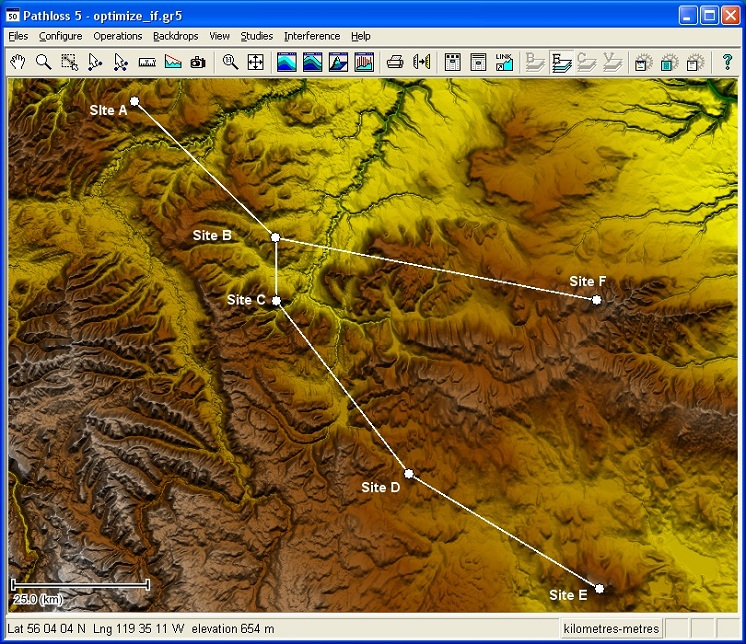Workshop on Pathloss 5
3 DAYS
INSTRUCTOR LED WORKSHOP
“OUR COURSES CAN BE SPECIALLY TAILORED TO ADDRESS YOUR REQUIREMENT – TELECONTRAN”

COURSE OBJECTIVES
Pathloss 5 program is a comprehensive path design tool for radio links operating in the frequency range from 30 MHz to 100 GHz. It is an advanced planning software to design microwave radio relay links and networks. Transmission engineers working on Microwave network planning uses this software tools to ensure a methodical and thorough approach to their task.
Covering a variety of topics ranging from software installation, upgrade to network design/operations, the objective of this training is to develop knowledge and skills of microwave link design using Pathloss 5 software.
After successful completion of this course, participants will be able to
- Understand microwave transmission propagation theory along with the basic features of Microwave radio system.
- Calculate Antenna heights as well as multipath and rain related performance using manual data and/or digital terrain models.
- Analyze path diffractions and multipath reflections and its effects and choose suitable countermeasures.
- Perform inter-system and intra-system interference calculations and ensure their frequency channels are free from harmful threshold degradations,
- Generate Link Budgets and understand the significance of multipath propagation reliability to design a large scale Microwave network.
- Calculate multiple parameters of the link and optimise them with respect to the ITU-R objectives as well as cost-effectiveness.
COURSE CURRICULUM
This course is targeted to transmission, Rollout engineers, specifically Microwave transmission engineers and technicians and those who are involved in Pathloss calculation to establish a microwave link.

Module 1: Pathloss 5.0 Software Installation and maintenance updates along with description of Error Messages and its Solutions.
Module 2: Architecture and Software files of Pathloss 5.0.
Module 3: Advanced Concepts of Microwave Engineering in the light of Pathloss 5.0
- Systems and components
- Basic Definitions of Reliability, Performance and Availability
- Selected NA (Bellcore) Definitions
- ITU-R Related Definitions
- Worst Month and Annual Parameters
- Availability and Performance Recommendations
- ITU-T G.821
- Availability Recommendation ITU-R F.557
- ITU-T G.826/828
- Comparing NA and ITU-R
- Antenna considerations, F/B ratio, discrimination, XPD impact
- Radio Adaptive Technologies
- ATPC Transmitter power control
Module 4: Visualization and Data Analysis for PTP & PTMP Operations
- Calculation methods and Algorithms
Module 5: PTP & PTMP Operations and its Configuration
Application Session:
- Calculation and diffraction loss methods and algorithms
- Setting of clearance criteria
- Network Options
- Site and Link data insertion
- GIS setup
- Network display configuration
Module 6: Equipment Files Formats and Setup for PTP & PTMP Operations
- Equipment databases and Frequency Plans
- AntRad Program: Creating and editing radio and antenna files
Application Session
- Configure equipment database and Frequency Plans
- Create Land Mobile (VHF-UHF) Radio files and Land Mobile (VHF-UHF) antennas using the AntRad program
Module 7: GIS for PTP & PTMP Operations
- Generating terrain profile between two sites
- Inserting and editing clutter and structures
Application Session
- Generate a terrain profile
- Input obstacles manually or using clutter files
Module 8: Optimization of Antenna Heights for PTP & PTMP Operations
- Setting antenna heights to meet clearance criteria for different antenna configurations
Application Session
- Verify and modify clearance criteria for a given path
- Set antenna heights for main and diversity antenna configurations
Module 9: Assessment of Diffraction Loss Module for PTP & PTMP Operations
- Calculating diffraction loss
- Explore the Automatic and Manual Diffraction Algorithms
Application Session
- Calculation of diffraction loss and its visualization.
Module 10: PTP & PTMP of Multipath and Reflection Module
- Variable and Constant Gradient Ray Trace
- Reflective Plane and Ray Tracing Reflection Analysis
- Countermeasure by Optimal Space Diversity antenna heights
- Ducting Effects
Application Session
- Analyze Reflective characteristics of a path using constant and variable gradient
- Analyze Reflection analysis and set optimize main and diversity antenna heights
Module 11: PTP & PTMP Transmission Analysis Module Operations
- Different ways of entering equipment parameters
- Parameters for applications: Microwave, Land Mobile
- XPIC and Space diversity calculations
- Selecting calculation methods and algorithms
Application Session
- Evaluation a path using ITU & Vigants-Barnett Multipath fading algorithms
- Evaluation a path using the Land Mobile application
Module 12: PTP Networks Link Generation and Design
- Network design of PTP links
- Link Design Rules
- Create PTP links
- Design and modify PTP links
- Frequency assignment
Application Session
- Identify LOS and connectivity between new sites and existing network
- Automatically design new PTP links
- Assign frequencies assignments
Module 13: Interference Calculation
- Setting Intra-System Interference Parameters
- Degradation option
- Reading and analyzing Interference reports
Application Session
- Perform an intra-system interference calculation
- Resolve potential cases of interference
Module 14: BS (Base Station) Configuration
- Configuration a Base Stations
- Adding Base Station and Mobile Specifications
Module 15: PTMP Networks Link Generation and Design
- Network design of PTMP links
- Link Design Rules
- Create PTMP links
- Design and modify PTMP links
- Frequency assignment
Application Session
- Create Land Mobile (VHF-UHF) PTMP links
Module 16: PTMP Coverage (Local and Area Studies)
- Terrain and Clutter loss considerations
- Propagation Parameters
- Local and Area studies
- Display criteria
Application Session
- Local and Area Coverage of a network
- Identifying marginal coverage areas
TRAINING/WORKSHOP | DURATION | TRAINING DATE | LOCATION |
Workshop on Pathloss 5 | 3 Days |
OUR HAPPY CLIENTS
WHAT OUR CLIENTS SAY ABOUT TELECONTRAN !!
Improved my knowledge about Pathloss 5 tool with excellent course content and coverage of the topic.
I have learnt new methods of how to calculate link planning, link budget and losses using Pathloss 5.
The course successfully covered microwave network planning, calculation of interference, interface test principle, Channel assignment with frequency distribution, Band and sub-band individuals.
The Training Material is well prepared with excellent technical depth and after the workshop I have a very clear understanding about Pathloss software.
The basic knowledge of all the transmission technologies presented during the course was very interesting and are easily applicable in my daily routine tasks.

